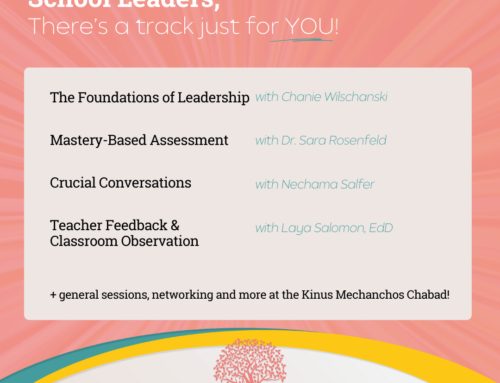This article is a part of a series. Click here for part one and part two.
In this post we will explore the second section of the Zekelman Standards for Chumash relating to the knowledge of Chumash content. Students are expected to retain knowledge of people, places, events and narratives, select quotations, terms and concepts and the Mitzvos explicitly written or derived from the content they learn.
You may ask: Why must students know all of this information? In the current information age, you can Google almost anything and find your answers. In General Studies, governments around the world are rethinking the curriculum and trying to balance content knowledge versus skills. The result is often new standards and new curriculum with certain content added and other content areas taken away as curriculum writers and standards’ teams decide what schools must find the time to teach and what is most important for students to know in an ever-changing world. In addition, in some subject areas, the content is secondary to the skill. If we want the students to be able to read, they can read most anything at their level for practice. If we want them to analyze texts in English, we can choose from a variety of texts, novels or poems. The content itself is just used as the medium to gain the skill. And herein lies a significant difference between Jewish and General studies.
The content of Chumash, was set by Hashem, the Creator and Master of the world. Torah comes from the root word “Horaah” demonstrating that the purpose of Torah is to teach us the lessons and commandments we need to learn for everyday life. Torah is not a history book, and in fact, for every event documented, there are numerous others not found in the Torah. As such we come to understand that not only the Mitzvos but also the events that are recorded for us throughout Tanach are those chosen as signposts for our daily lives. Chazal tell us “Maaseh Avot Siman Libanim” – the actions of our “fathers” – our ancestors, and by default the events that occurred in their lives, are a sign for their children. A sign is a guiding post or signal for how to live our lives in particular circumstances and both what we should and should not do in such circumstances. Chazal further tell us, that the actions of our forefathers are not only signs for us, but actually also empower us with the ability to overcome and withstand similar challenges should they occur in our lives.
We can now understand why Torah content does not change with time and why the content itself must be studied, not only to gain the skills of study but for the knowledge itself. If we want our children to be able to lead a Torah life, they need to be well versed in what the Torah says. In the younger years, this means knowing the events of Creation and the stories of our forefathers and of how we became a nation. What challenges did our forefathers face and how did they react and overcome them? As they mature, they learn about the responsibilities of a nation versus the individual and the co-dependence that is required both in Eretz Yisroel and in Chutz L’Aretz. When students begin Mishna study, and/or specific units in Halacha, they also begin to understand how the Mitzvos that we keep in our daily lives are derived from specific verses in the Torah.
To use a monetary analogy: When students build their bank of Torah knowledge, and know it well, we equip them with the capital and investments that they need to be able to make withdrawals against their assets in the daily lives. This applies both in terms of their own self-image, self-respect, self-esteem and resilience and in their actions, reactions and interactions with others.
In addition, as Torah is Hashem’s word, when we learn it, know it, and can recite elements of it wherever we are, we are connecting to Him on a personal level and transforming the environment we are in from a purely mundane physical space to a place of Holiness. And that ultimately, is one of the reasons Man was created in the first place, to make this world, and every corner of it, a dwelling place for Hashem, a place where He is felt and acknowledged.
We are now coming from the month of Sivan, where we reaccepted the Torah as we do each and every year on the day of Shavuos. To what degree are we knowledgeable In Torah? Are our Torah bank accounts full enough?
For more information about the Zekelman Standards standards please visit https://zekelmanstandards.org/
Dr. Sara Rosenfeld is on the Zekelman Standards Development Team. She is also the director of Curriculum in Yeshiva-Beth Rivkah Colleges in Melbourne, Australia, and author of numerous Judaic curricula and workbooks, Dr. Rosenfeld is sought after as a presenter and Jewish educational consultant around the world.




